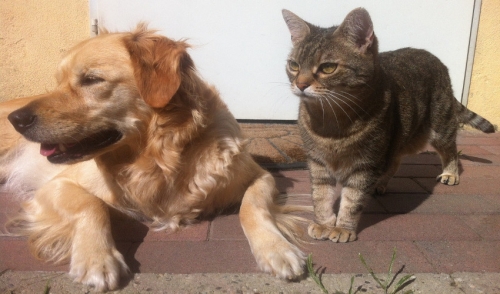How to Get Urine Odor Out of Carpet

Getting Rid of Pet Urine Smell – For Good!
Article Publish date May 01, 2019
Every pet owner has to deal with the occasional indoor "accident" whether it is before a young pet is properly housetrained, consequences of an illness, the aging of a pet or just an overly excited or stressed pet that may have less control. What no pet owner has to deal with, however, is the ongoing smell from urine accidents. With the proper steps, it is easy to control odors and eliminate pet urine smell entirely.
12 Easy Ways to Eliminate Pet Urine Smells
Depending on a pet's diet, health and the frequency of accidents, urine smells can become quite overpowering. Fortunately, there are easy ways to eliminate those odors…
- Soak It Up
When a pet has an accident, it is critical to soak up as much urine as possible as quickly as possible. Use paper towels and dab or blot the puddle, but do not smear it around or else more space will get stained and contaminated. If the puddle is on carpet or fabric, use strong pressure to blot the area until it is as dry as possible. The paper towel should be disposed of immediately, preferably in an outdoor trash can so there are no lingering smells. - Use Enzymatic Cleaners
Enzymatic cleaners will break down the molecules of pet urine to eliminate odors. There are several types available, and they should be used according to the proper instructions. Use the cleaners as quickly as possible to minimize any odors or lasting stains. - Opt for Baking Soda
Baking soda naturally neutralizes odors. Sprinkle it liberally on the damp area or even an old urine stain, and work the powder gently into the fibers of any fabric, rug or carpet. Let the baking soda sit overnight for maximum odor absorption, then vacuum it up to remove the smell completely. - Keep It Dry
Any urine smells will be stronger when they are fresh and damp, and the longer fabrics remain damp, the more potent the smell will seem. After cleaning up the puddle, the fabric, rug or carpet must be thoroughly dried. Use a fan to improve air circulation, and open windows if possible to help fresh air circulate to minimize odors. - Find Old Stains
If new puddles have been cleaned up but odors remain, it is possible there are old, smelly stains around. Use a black light to see old urine stains on carpets and fabrics, and treat them with enzymatic cleaners, baking soda and other odor-eliminating treatments. - Try Wet Vacuuming
When a stain is older or deeper in a rug or carpet, a strong carpet cleaning may be necessary. Use only cold water for this cleaning (higher temperatures could bond the urine to the fabric so it cannot be removed), and add an enzymatic cleaner for more thorough breaking down of odor-causing proteins. After vacuuming, allow the area to dry thoroughly. - Remove Rugs and Carpeting
There may be times where there have been so many accidents or the pet's health may make it difficult to completely remove odors or prevent future unwanted puddles. In this case, it may be best to remove fabrics that can soak up urine – it will be much easier to eliminate urine smells from tile or linoleum flooring instead of fabrics. - Clean More Than Floors
Pet urine gets on more than flooring, and stains that are left on walls, furniture legs or draperies can continue to smell long after the floor has been cleaned. Similarly, incontinent pets may "leak" on their bedding. When a pet urinates or sprays on other items, they need to be cleaned and deodorized just as thoroughly as the floor or else the odors will linger. - Consider Professional Cleaning
Professional carpet and fabric cleaning services have stronger equipment and are better able to detect and remove old urine stains that may still smell. While it may be more expensive to hire a professional cleaning service, it can be well worthwhile if many stains need to be removed or stubborn areas need more complex treatment. - Keep the Litter Clean
Even if a pet urinates in the proper area, occasional near-misses can cause odors to linger and grow stronger. Clean the litter box, puppy pad area or similar location frequently, using enzymatic cleaners and other deodorizing agents as needed. Bear in mind, however, that some small odors may well remain in this area and can help remind your pet about the right area for their business. - Reinforce Training
Once a pet is housebroken, their training shouldn't be over. Frequent refreshers for their potty training can help reinforce where it is appropriate for them to urinate. Letting pets outdoors more often or scheduling more frequent walks and potty breaks can help minimize accidents that would lead to unwanted odors. - Consider Diet and Health
While an animal's urine naturally smells – those scent markers help designate territory – a very strong odor or abrupt odor change may indicate health problems. A change in diet can also affect the odor of urine, and offering your pet certain foods can reduce odors. If a bad smell persists, consult with a veterinarian to investigate any digestive or other problems or health issues.
Dealing with occasional urine accidents and odors is part of being a pet owner, but by taking several steps to minimize those odors, it is possible to eliminate the smells and keep your home fresh and pet-friendly at the same time.
How to Get Urine Odor Out of Carpet
Source: https://hcsummers.com/blog/48626/getting-rid-of-pet-urine-smell-for-good